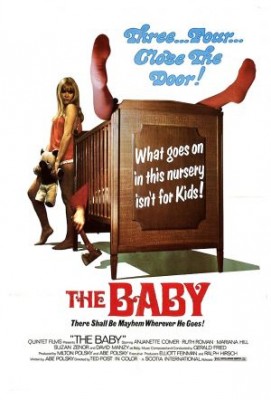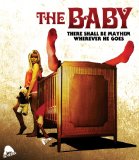| Reviews & Columns |
|
Reviews DVD TV on DVD Blu-ray 4K UHD International DVDs In Theaters Reviews by Studio Video Games Features Collector Series DVDs Easter Egg Database Interviews DVD Talk Radio Feature Articles Columns Anime Talk DVD Savant Horror DVDs The M.O.D. Squad Art House HD Talk Silent DVD
|
DVD Talk Forum |
|
|
| Resources |
|
DVD Price Search Customer Service #'s RCE Info Links |
|
Columns
|
|
|
Baby, The
Produced on a modest but adequate budget, The Baby is pretty mild with little in the way of graphic violence (it was rated PG) but fairly depraved in terms of subject matter. The intent of the filmmakers' isn't entirely clear: there are vague hints Polsky and others involved with its production were attempting some sort of serious psychological thriller about child abuse stemming from psychologically unbalanced women but mostly it's just a pointless and despairing film prompted by the financial success of What Ever Happened to Baby Jane?-type horrors.
Scotia International distributed The Baby initially. That short-lived (1970-74), minor company is all but forgotten and nearly impossible to research today, but regardless their logo does not appear on Severin Films' Blu-ray. So perhaps rights were acquired from the original production company, Quintet Films, which made no other movies. The transfer, "restored from the original negative," looks good and is supplemented with a couple of interesting extra features.
Los Angeles social worker Ann Gentry (Anjanette Comer) is tasked with assessing the health and welfare of "Baby" (David Manzy, later David Mooney), the apparently mentally impaired 30-ish adult man who acts and is treated like a toddler. Cared for by his mother, Mrs. Wadsworth (Ruth Roman), and his two sisters, Germaine (Marianna Hill) and Alba (Suzanne Zenor), Baby spends most of his day in diapers in an enormous crib and playpen, and completely dependent. The Wadsworth family is eccentric to say the least. Mrs. Wadsworth shows no interest in trying to improve Baby's mental state, Germaine has an unhealthy sexual appetite that seems to include Baby, and Alba is a sadist who enjoys tormenting him with a cattle prod.
Ann takes a special interest in Baby, apparently stemming from some kind of accident involving her husband Roger. "It should have been me," she tells her live-in mother-in-law (Beatrice Manley) while looking at slides of the once-happy couple, "It was my fault."
A power struggle ensues over Baby's future, with Ann insisting Baby isn't mentally disabled but rather the result of continual negative reinforcement, while Mrs. Wadsworth complains to Ann's boss (Joseph Bernard) that the social worker is becoming obsessed and acting inappropriately. Extreme measures are taken on both sides and there's a twist at the end that, admittedly, caught this viewer by surprise. However, the ending leaves a major (and literal) plot hole that doesn't hold up to any scrutiny.
The movie isn't much beyond its squirmily uncomfortable scenes of watching an adult man have his diapers changed, a babysitter comfort Baby by offering him her breast, of sister Germaine taking off her nightgown and joining him in his crib, etc.
Spider Baby had a similar set-up, likewise with two adult sisters and a infantile, mentally deficient brother (played by Sid Haig), the main difference being in that film their guardian was a gentle patriarchal character (Lon Chaney, Jr.) while in The Baby it's a madwoman in the Baby Jane mold. In Spider Baby, the family avoids detection from the authorities because they live in a secluded house and off the grid, while the Wadsworths less believably are in central Los Angeles and social butterflies: Ma plays bridge occasionally while the family hosts a big birthday bash for Baby, yet no one (including lascivious, pot-smoking party guest Michael Pataki) seems at all disturbed by the sight of the full-grown man in diapers.
The film shows bad judgment in a pointless scene where Ann visits a school for mentally-disabled children, with real Down's Syndrome kids and polio victims exploited for what amounts to a lurid thriller.
Director Ted Post, who died last year at 95, was a prolific television director, where he proved particularly adept helming Western and action-oriented series like Gunsmoke and Combat!. Following two minor films he directed in the 1950s, Post segued back into feature films with Hang ‘Em High (1968), an imitation Spaghetti Western starring Clint Eastwood, whom he directed again in Magnum Force (1973), the second Dirty Harry movie. For some reason, though, Post's films tend to exhibit pedestrian direction at odds with the episodic television he helmed on tighter budgets and shorter shooting schedules. Though not a good movie, The Baby is better directed, showing more imagination than his bigger features.
Technically the movie is fine, with production values a bit higher than the average made-for-TV movie. Gerald Fried's score is rather good, Comer gives a subtly disturbing performance and Roman gives an appropriately broad one. A few Ted Post regulars populate the cast, including Manley and ex-Monogram horror actor Tod Andrews, also the Skipper in Beneath the Planet of the Apes, who died shortly after filming his one scene and prior to the film's spotty release.
Video & Audio
Shot for 1.85:1 exhibition, The Baby's 1080p transfer is pretty good, with accurate color, contrast, and decent sharpness, though the color timing seems a bit off in one sequence, where night becomes day and back again. The Dolby Digital English mono, with no subtitle support, is also up to the task.
Extra Features
Supplements include two audio-only interviews, both conducted over the telephone, the first with the late Ted Post which plays over clips from the film, the second with actor David Mooney, which features a photograph of the actor as he is today. The interviews, incidentally, are mixed-up on the menu screen, with Post's on Mooney's and vice-versa. Also included is a give-away-the-store, crudely narrated original trailer.
Parting Thoughts
I'm glad I saw it once, but The Baby is no lost classic though it's not exactly bad, either. Outré-minded film fans might enjoy it, but others will want to Rent It.
Stuart Galbraith IV is the Kyoto-based film historian and publisher-editor of World Cinema Paradise. His credits include film history books, DVD and Blu-ray audio commentaries and special features.
|
| Popular Reviews |
| Sponsored Links |
|
|
| Sponsored Links |
|
|
| Release List | Reviews | Shop | Newsletter | Forum | DVD Giveaways | Blu-Ray | Advertise |
|
Copyright 2024 DVDTalk.com All Rights Reserved. Legal Info, Privacy Policy, Terms of Use,
Manage Preferences,
Your Privacy Choices | |||||||















